September 15, 2021
![]() 12 mins Read
12 mins Read
Here are our favourite six glamping stays that made it into positions 75 to 81 of our coveted list of 100 unique stays. Head here to read the full list and start planning your next escape.
The sun starts to slip lower in the sky as we sit beside the light-dappled dam on Glenayr Farm attempting to absorb the last of its warmth for the day. My partner and I are making our way through a guided wine tasting of some of Mudgee’s finest when two curious kangaroos appear on the other side of the dam. Stephanie Ross, owner of Exclusively Mudgee, pauses our tasting as we watch the pair cautiously nibble away at the long strands of straw-coloured grass that frame the dam. It isn’t long before our marsupial guests lose interest and bound off beyond our view. It’s a memorable introduction to our first night glamping on the 130-hectare working sheep farm.
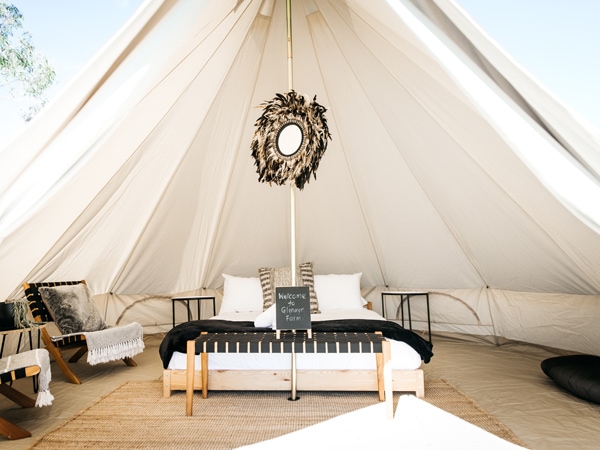
Glenayr offers a luxurious stay amongst untouched nature. (Image: Lean Timms)
This sprawling parcel of land is set in blissful seclusion, completely off-grid and solar-powered; I lost my wi-fi signal the moment we took the first bend in the winding, unsealed road up to the glampsite. But for all its seemingly rugged isolation, Glenayr is only a 25 minute drive from Mudgee and the world-renowned wineries that surround it. I can see our bell tent, Pinot, from the dam, one of four pitched on the side of the hill now bathed in the soft glow of a pastel-pink sunset. (Two off-grid villas have been added since my stay.) Each tent is spaced 15 metres apart for privacy, but close to the communal quarters that house two bathrooms with hot showers, a kitchen and lounge room with indoor fireplace, television, a billiards table and plenty of games, DVDs and books for entertainment. Not that you need it.
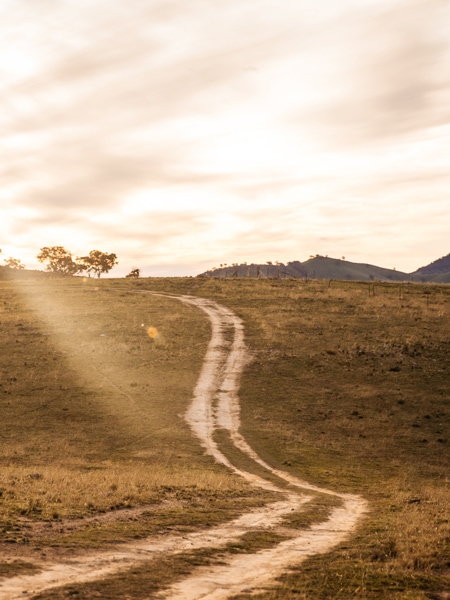
Glenayr’s country landscape. (Image: Lean Timms)
The beauty of this place is found in the simple pleasure of doing nothing at all. We’ve pre-booked the wood-fired hot tub for the night and hurry to collect kindling and logs from the shed to heat the water before we lose the last light of day. It’s not long before darkness falls and we’re treated to a nature show of a different kind as the stars come out to shine. We slip into the tub and take in the sights. Smoke billows from the pipe above, I hear the fire pit crackling below and feel the peacefulness of the moment seep into my bones. Soon a steak will be sizzling on the barbecue for dinner and we’ll gather around the fire to let the heat fight the coolness in the crisp, country air before retreating to our cosy queen-size bed for the night. – Katie Carlin
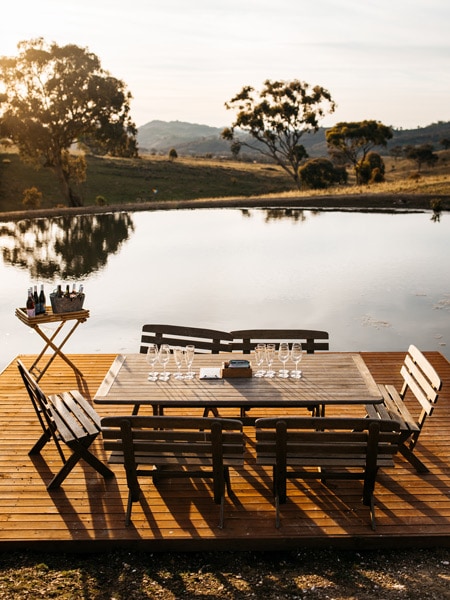
Enjoy a drink with a view. (Image: Lean Timms)
Getting there: 32°45’00.7″S 149°32’05.7″E
Get this: there are only four safari-style tents at Nightfall, set up in 104 hectares of private land right beside World Heritage-listed Lamington National Park – which is one of the most species-rich rainforests on Earth. While it smells like I’m camping (and what can beat that smell of canvas, wet rainforest and wood fire?), this tent has hardwood timber floors, a king-size bed and twin galvanised-tin French vintage bathtubs, while gourmet organic meals are served up for me beside a creek that runs through the entire property. In the evenings, dingoes call out from the wild, while red-necked wallabies are my closest neighbour. – Craig Tansley
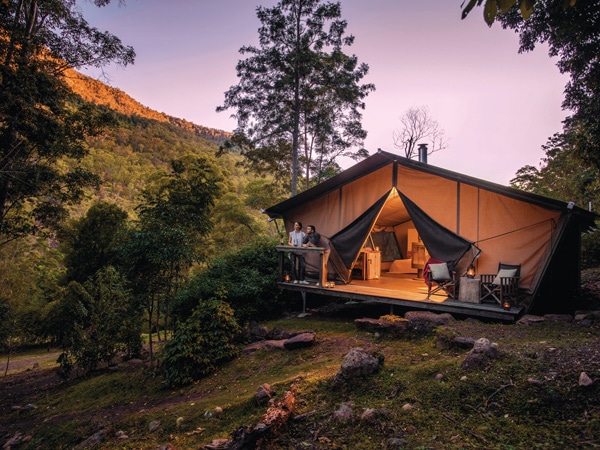
Rest comfortably amongst the tropical Queensland bush. (Image: Tourism and Events Queensland)
Getting there: 28°17’37.1″S 153°03’41.2″E
A fair-dinkum, true-blue, bonza piece of Australiana, Home Among the Gumtrees quite probably lives rent free in your memory bank. Without doubt, the classic John Williamson tune is an earworm. It would also make for an ideal soundtrack if you ever find yourself bedding down at Bellwether Wines. Set against a backdrop of 500-plus-year-old red gums, Bellwether campground puts guests in the thick of the Australian country landscape. Even better, it puts guests adjacent to exceptional wine. Bellwether is home to one of the region’s most impressive cellar doors, a refurbished 1868 Glen Roy Shearing Shed, packed with charm and not short of a robust Coonawarra red. Meanwhile the site’s six bell tents make for a tranquil stay, where reconnection awaits. – Kate Symons
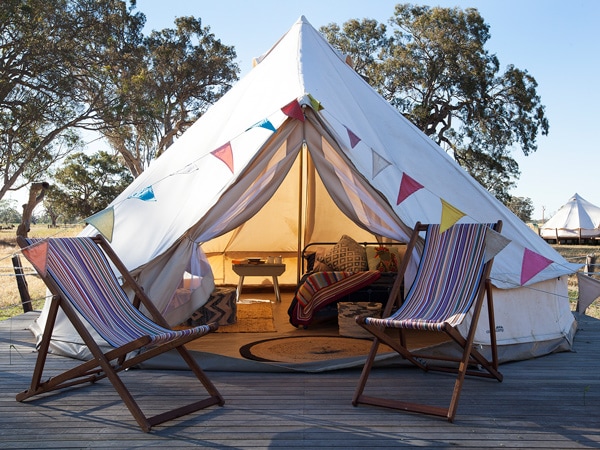
Stay below the gumtrees in the Bellweather tent.
Getting there: 37°13’51.6″S 140°51’14.3″E
At night you might hear a dingo howl above the desert wind and share your open-air shower with a green frog. There may be more luxurious glampsites around, but few connect to the outback landscape the way that Karijini Eco Retreat does with the deep-red Pilbara earth. The Gumala Aboriginal Corporation-owned property nestles in the nape of one of Australia’s lesser- travelled natural wonders: Karijini’s gorges. Canyoning tours drop you deep into subterranean slot gorges that harbour rock rainbows and gemstone-green waterholes. Outdoor yoga classes drag you back into equilibrium afterwards. In pursuit of eco-credentials, the safari tents are relatively simple (no or low power and no air-con), but generously spaced enough to let you sense this landscape’s tangible energy in peace. – Steve Madgwick
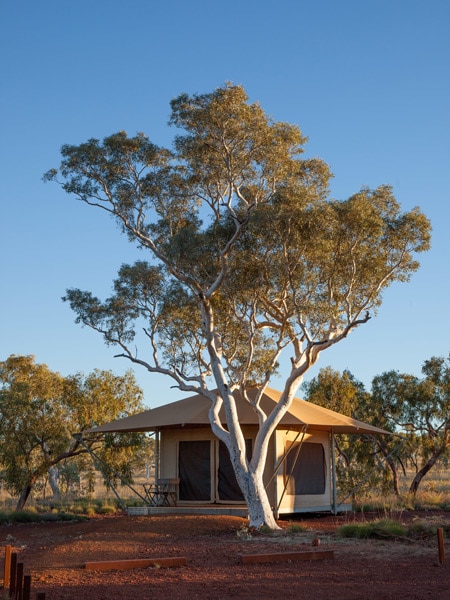
Experience true Australian bush with a stay in Karijini Eco Retreat. (Image: Nick Rains Imaging)
Getting there: 22°23’04.1″S 118°15’50.6″E
I’m a big believer that the journey contributes to the sum of a stay’s parts, and my passage to Kings Canyon Resort makes for a spectacular equation, involving as it does a breathtaking landing past Uluru, followed by a 45-minute light-plane journey over a limitless ochre landscape punctuated by low scrub and dark green bushes scattered like windswept confetti. Landing onto a red-dirt airstrip at Kings Creek, it’s a 40-kilometre drive to finally reach the outback outpost.
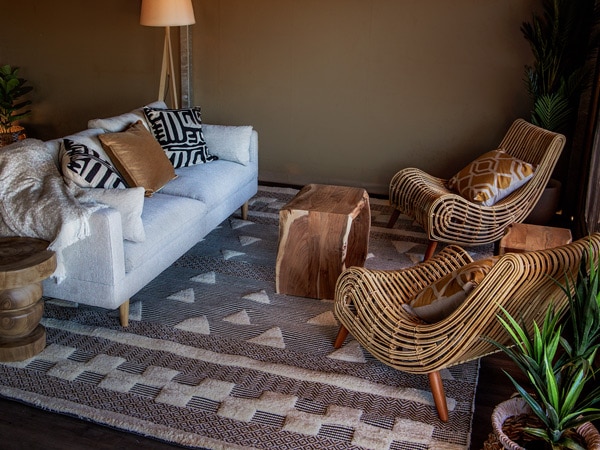
Kings Canyon earthy interior.
Situated within the 1050-square- kilometre Watarrka National Park, Kings Canyon has long lured road-trippers, who stop a while and explore the canyon’s expanses. While the resort boasts a sprawling camping ground, as well as hotel, spa and dorm-style rooms, my own journey ends as I sink into a chair on the deck of one of its luxe canvas safari-style glamping tents.
A suitable remove from the main resort, the tents are spacious and welcoming, kitted out in earthy tones, with a relaxed luxe feel. There’s a living/dining area, pillow-soft king bed and en suite bathroom complete with shower, while windows on three sides look out to the Northern Territory landscape. I trade my canvas canopy for one of abundant stars at the resort’s signature ‘Under the Moon’ degustation dinner, an outdoor affair of flavoursome dishes utilising local produce and bush tucker ingredients.
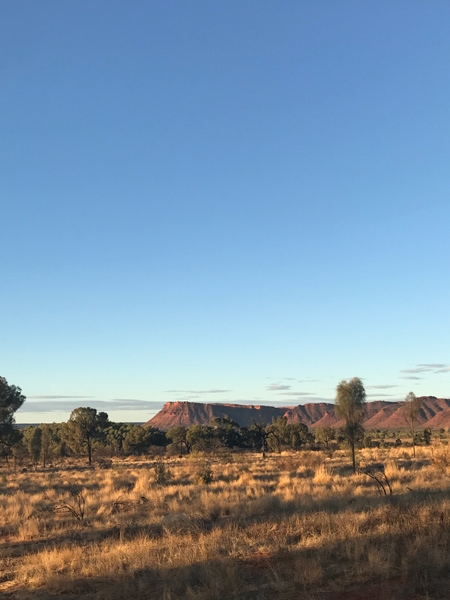
Escape the rush of life at Kings Canyon.
After the walk back to my tent by torchlight, I sink into sleep, all zipped up for the night. I wake later to the sound of howling dingoes in the distance, the canvas walls offering both a cosy shell and unfiltered access to the sounds of the surrounding environment. A highlight of Kings Canyon Resort is its irresistible proximity to the canyon itself. In spite of the outback symphony the night before, I’m up before the sun to take on the six-kilometre Rim Walk that skirts the edge of the vertiginous canyon. The walk starts with a 500-step climb, but the views out to Watarrka National Park, bathed in sunrise pinks and golds, is stunning. My trek traverses scrubby plateaus and solid red rock, and descends into the verdant oasis of the Garden of Eden, ending three hours later back where I started.
After lunch back at the resort, I head to Karrke Aboriginal Cultural Experience. Owned and operated by Christine Breaden and Peter Abbott, members of the local Wanmarra Aboriginal Community, tours here are designed to share and preserve the generous hosts’ Luritja and Pertame languages and culture. I learn about art and cultural practices, weapons (little-known fact: boomerangs in this part of Central Australia don’t return) and medicinal plants used for millennia. Combining the Rim Walk with a visit to Karrke is essential in my books; seeing the dramatic beauty of the land and then meeting the people who have called it home for a mind-bending period of time confirms how essential respecting the past is to creating a positive future for our country.
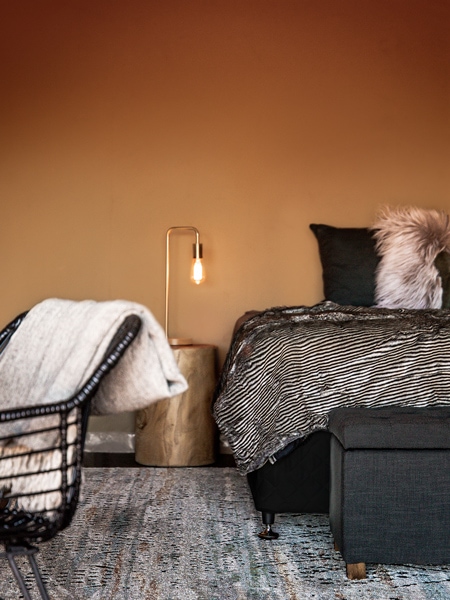
Kings Canyon bedroom detail.
After another night under canvas, my journey out of Kings Canyon Resort is taken by road. While the landscape outside the window stays largely low and uniform, a stop at Lake Amadeus/Pantu offers spectacular contrast. The salt lake’s grey and milky white expanse stretches to a hazy line on the horizon. As I stand looking across it, the wind in my ears the only sound, the full equation of my glamping stay at Kings Canyon Resort is complete. – Leigh-Ann Pow
Getting there: 24°15’08.3″S 131°30’37.3″E
Eco and glamping kind of go hand in hand, given the off-grid allures that the luxe version of camping offers. But Alkira Eco-Glamping Retreat in Victoria’s spectacular Dandenong Ranges relies on more than just close proximity to trees to own the much (over)-used distinction. Sitting on hosts Emily and Andrew’s 16-hectare property of farmland and thick eucalyptus bush just minutes from the town of Emerald, Alkira is a former open-air artist’s studio that has been converted by hand into a charmingly rustic straw-bale yurt.
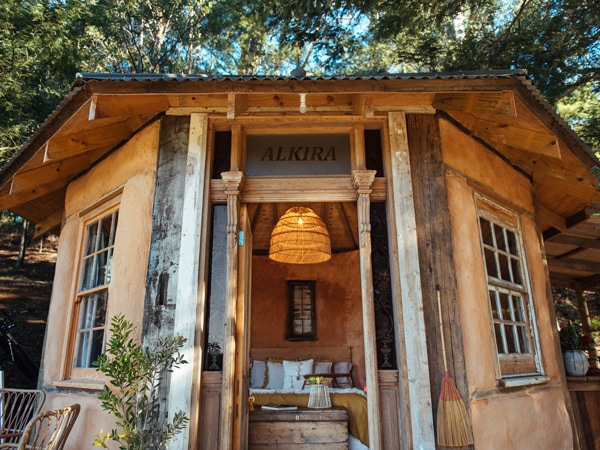
Experience an eco-friendly stay in the luxurious Alkira yurt. (Image: Jaccob McKay)
Decked out with boho-chic touches and a sunny palette of yellows and white, the details are delightful in their execution: from the generous bed, draped in fresh linen and positioned so you can look out through the leadlight-lined front door; to the cute table for two under the window where you can enjoy breakfast, made from ingredients left for you in the covered outdoor kitchenette (freshly baked bread and brewed coffee are staples); to the retro radio, games, books and magazines that will help while away the hours sitting outside shaded by mountain ash trees; to the outdoor fire pit beside which you can warm yourself as you sit under the stars. As for the bathroom, it sits a short walk from the yurt, housed in an impossibly cute corrugated iron and wood outhouse.
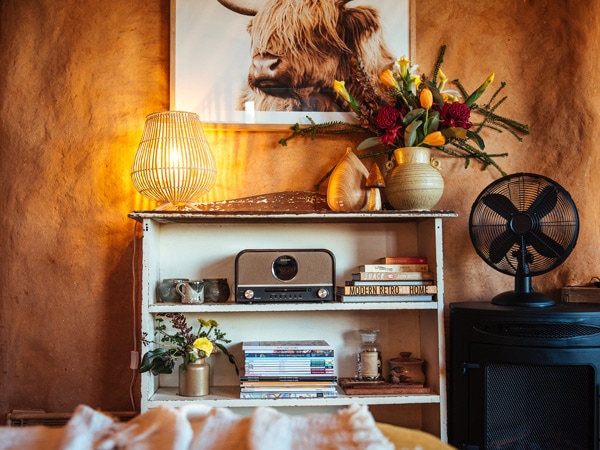
Alkira interior details (image: Jaccob McKay)
Its simple exterior hides its luxe inclusions including a rain shower, designer toiletries and a composting toilet. Once settled in, time can be spent exploring the farm itself, which is home to cows, horses, alpacas and ducks paddling in the creek and native wildlife and birds, and the surrounding area. There’s shopping to be had in the nearby village of Kallista, the Puffing Billy steam railway to transport you back to your childhood, and hikes and treks aplenty within the lush, green expanse of the Dandenong Ranges National Park. And, of course, you can always choose to do nothing at all: just like eco and glamping go hand in hand, relaxing and glamping are also very happy bedfellows.
Getting there: 37°54’35.6″S 145°25’53.3″E
Forget the typical donga-style tourist digs that are so common around the Northern Territory – the Latham family has raised the accommodation bar several notches, offering visitors like me a classy outback experience that won’t break the bank. Nestled at the edge of Litchfield National Park, this hideaway has a portfolio of three sleek cabins surrounded by bush, 90 minutes from Darwin. Made from 12-metre shipping containers sliced in half – producing one single-level pavilion and two double-storey spaces – each of the villas has a lounge area, fully equipped kitchen and bathrooms with rain showers.
Looking for a bath? I found a series of crystal-clear rock pools to relax in three kilometres down the track at Cascades, before taking a walk in the monsoon forest. A few kilometres on, I fell in love with Wangi Falls, a big name in Litchfield together with Florence Falls. Wangi has a well-marked path that I followed up the mountain and over the top of the waterfall before descending back to the cool, huge pool below. Back at ‘camp’, the Latham family have stocked the fridge with eggs and bacon, milk, and a few treats so I can skip the grocery shop for breakfast. Self-described “bushies”, Roger and Vivian built their own home on this property with the help of their sons.
With the popular swimming holes of Litchfield on their doorstep, the couple said it made sense to add some tourist accommodation, too. “We just love living here and we wanted to share it, so that’s how the cabins came about. All the family pitched in and helped, and we ended up with something special,” says Roger. Looking out at the kangaroos, surrounded by bush – and sipping a cold pinot gris – I couldn’t agree more with Roger. This is special. – Leah McLennan
Getting there: 13°06’28.5″S 130°39’08.7″E
Read all 100 unique stays around Australia here.
For the  best travel inspiration delivered straight to your door.
best travel inspiration delivered straight to your door.
‼️‼️‼️‼️‼️‼️‼️‼️‼️